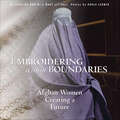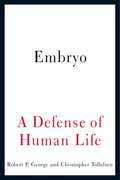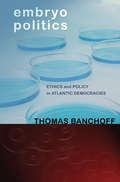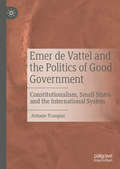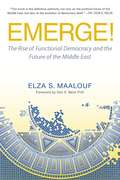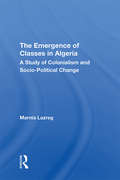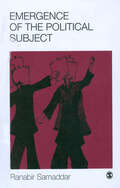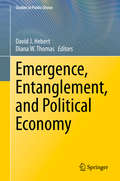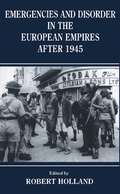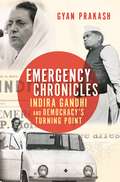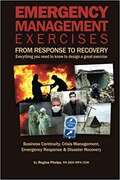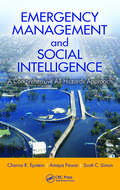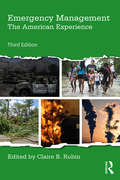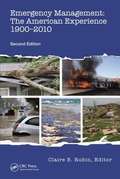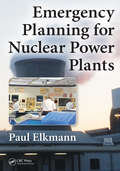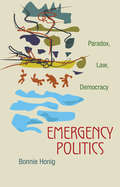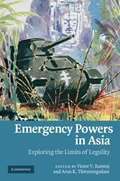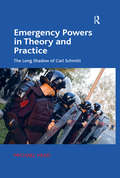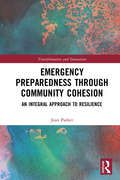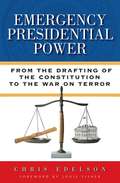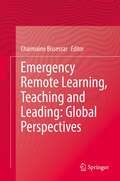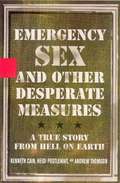- Table View
- List View
Embroidering within Boundaries: Afghan Women Creating a Future
by Rangina HamidiWinner, Silver Medal in the Multicultural Category, 2018 IBPA Benjamin Franklin Awards Fifteen years ago, Rangina Hamidi decided to dedicate her life to helping rebuild her native Kandahar, Afghanistan. The Taliban had been driven out by American forces following 9/11, but Kandahar was a shambles. Tens of thousands of women, widowed by years of conflict, struggled to support themselves and their families. Rangina started an entrepreneurial enterprise, using the exquisite traditional embroidery of Kandahar, to help women work within the cultural boundaries of Pashtunwali to earn their living and to find a degree of self-determination. Thus Kandahar Treasure was born. This book traces the converging paths of traditional khamak embroidery and the 300 brave women who have found in it a way to build their lives. The late, award-winning photojournalist Paula Lerner was dedicated to telling the stories of women in Afghanistan. Her remarkable images throughout the book show Afghan women's profound struggle, strength, and beauty.
Embryo
by Robert P. George Christopher TollefsenGeorge (jurisprudence and American ideals and institutions, Princeton U. ) is a member of the President's Council on Bioethics, so readers who think that august body is benefiting the world may be interested to learn about the murk its house is built on. He and Tollefsen (philosophy, U. of South Carolina) clearly have no competence to discuss the biology of human development or the theology of life and death. That is just fine, however, because their argument is all about politics and power. Annotati...
Embryo Politics: Ethics and Policy in Atlantic Democracies
by Thomas BanchoffSince the first fertilization of a human egg in the laboratory in 1968, scientific and technological breakthroughs have raised ethical dilemmas and generated policy controversies on both sides of the Atlantic. Embryo, stem cell, and cloning research have provoked impassioned political debate about their religious, moral, legal, and practical implications. National governments make rules that govern the creation, destruction, and use of embryos in the laboratory—but they do so in profoundly different ways.In Embryo Politics, Thomas Banchoff provides a comprehensive overview of political struggles about embryo research during four decades in four countries—the United States, the United Kingdom, Germany, and France. Banchoff’s book, the first of its kind, demonstrates the impact of particular national histories and institutions on very different patterns of national governance. Over time, he argues, partisan debate and religious-secular polarization have come to overshadow ethical reflection and political deliberation on the moral status of the embryo and the promise of biomedical research. Only by recovering a robust and public ethical debate will we be able to govern revolutionary life-science technologies effectively and responsibly into the future.
Emer de Vattel and the Politics of Good Government: Constitutionalism, Small States and the International System
by Antonio TrampusThis book explores the history of the international order in the eighteenth and nineteenth century through a new study of Emer de Vattel’s Droit des gens (1758). Drawing on unpublished sources from European archives and libraries, the book offers an in-depth account of the reception of Vattel’s chief work. Vattel’s focus on the myth of good government became a strong argument for republicanism, the survival of small states, drafting constitutions and reform projects and fighting everyday battles for freedom in different geographical, linguistic and social contexts. The book complicates the picture of Vattel’s enduring success and usefulness, showing too how the work was published and translated to criticize and denounce the dangerousness of these ideas. In doing so, it opens up new avenues of research beyond histories of international law, political and economic thought.
Emerald Ridge: A Max Blake Mystery (The Max Blake Mysteries #6)
by William FlorenceA detective hunts for a missing archbishop in Northern Ireland who may a victim of violence—or an instigator of it . . . Oregon detective and former muckraking journalist Max Blake&’s discovery of a long-dreaded postcard from Ireland in his mailbox is the catalyst that touches off a cross-continent search for his fiancée&’s favorite uncle. The Rev. Sean &“Jack&” O&’Lennox, the archbishop of St. Patrick&’s Roman Catholic Cathedral in Armagh, Northern Ireland, is missing, and the postcard—a pre-arranged signal—is his apparent cry for help. Max is prepared to do everything in his considerable power to help Caeli Brown, his longtime partner in the Blake & Brown Detective Agency and soon-to-be wife. But she slips off to Ireland without him, and he is left with a double quandary: finding Caeli, and then determining the fate of the archbishop, a complicated man who believes that British-held Ulster should be returned to the Irish Republic by any means necessary . . .
Emerge!
by Elza S. MaaloufIn the Middle East, turmoil has spread quickly. Oppression, inequality, and violence have been keyed in to the very makeup of its society. But what causes a culture to emerge and prosper or stagnate and fail? How can the people take charge of their own inalienable rights to growth, freedom, and life - to keep from backsliding into the grasp of old, unhealthy ideologies and meet their need for ascendance? In Elza Maalouf's groundbreaking new book Emerge! The Rise of Functional Democracy in the Middle East, we are introduced to a new paradigm for governance based on Clare Graves' theory of Spiral Dynamics. Maalouf, the founder of the Center for Human Emergence and the Build Palestine Initiative, is an expert on the application of Spiral Dynamics in the Middle East. By placing democracy in an evolutionary, values-system context that is specific to unique, Middle Eastern characteristics, Emerge pioneers the foundations for necessary change. Where the West's approach to conflict resolution has failed due to lack of memetic understanding, Maalouf's framework for decoding the complexities of the Middle East succeeds. By weaving together the threads that make up the pattern of each culture, Emerge shows the crucial role memes play in creating a system of governance that truly fits. Not only does Emerge ask us to seek understanding before we structure and create, it shows us the necessity of teaching our youth to build their own sustainable, indigenous constructs.
Emerge!: The Rise of Functional Democracy and the Future of the Middle East
by Elza S. Maalouf Don E. BeckIn the Middle East, turmoil has spread quickly. Oppression, inequality, and violence have been keyed in to the very makeup of its society. But what causes a culture to emerge and prosper or stagnate and fail? How can the people take charge of their own inalienable rights to growth, freedom, and life-to keep from backsliding into the grasp of old, unhealthy ideologies? In Elza Maalouf's groundbreaking new book Emerge! The Rise of Functional Democracy in the Middle East, we are introduced to a new paradigm for governance based on Clare Graves' theory of Spiral Dynamics. Where the West's approach has failed due to lack of memetic understanding, Maalouf's succeeds by placing democracy in an evolutionary, values-system context specific to unique, Middle Eastern characteristics. Not only does Emerge ask us to seek understanding before we structure and create, it shows us the necessity of teaching our youth to build their own sustainable, indigenous constructs.
Emergence Classes Alg/h
by Marnia LazregThis book seeks to determine the impact of colonialism on the evolution of social classes in Algeria from 1830 to the present, and to analyze the relationship between classes and political and economic development.
Emergence of the Political Subject
by Ranabir SamaddarThis book is on the political subject, the conditions of its emergence, and the theoretical implications of this emergence, particularly those for our history. It seeks to change the way in which we understand our modern political history and the way inquiries are conducted into political life, truth and collective existence. The book is not only marked by dense, contentious and varying histories of turbulent political moments in our recent past, but also presents a startling picture of the emergence of the political subject, which has been repeatedly sought to be brought under submission, but which has resisted all such attempts and has instead emerged as a mark of autonomy and agency in life. Emergence of the Political Subject discusses substantial philosophical interventions to demonstrate why we need less of western political theories and philosophies to understand colonial and post-colonial political life. Instead, we need appreciation of political actions and a different way of analysing them. As against power, it is resistance; against domination, it is desire; against rule, it is friendship; against sovereign authority, it is bare body; against the ‘culture of self’ it is subject-hood—one can find in the story of the emergence of the political subject the overturning of the established world of knowledge. The work contains some fascinating accounts of the dialogic practices which it weaves into a critical theory of politics. This book will leave a lasting impact on the way we see politics, history of our democracy, transformation, masses and their agency, and will be useful to the world of academia, especially those engaged in the discipline of political science, history and philosophy.
Emergence, Entanglement, and Political Economy (Studies in Public Choice #38)
by Diana W. Thomas David J. HebertThis volume is intended to serve as a review of the “next generation” of political economy scholars in what can be called the “Wagnerian” tradition, which traces its roots to Buchanan and De Viti De Marco in the 1930s, who argued that any decision that results from a political entity must be the product of individual decision makers operating within some framework of formal and informal rules. To treat these decisions as if they were the product of one single mind, or even simply the additive result of several decisions, is to fundamentally misunderstand and mischaracterize the dynamics of collective action. Today, Richard Wagner is among the most prominent theorists in analyzing the institutional foundations of the economy and the organization of political decision-making. In this collection of original essays, former students schooled in this tradition offer emerging insights on public choice theory, public finance, and political economy, across a range of topics from voting behavior to entrepreneurship.
Emergencies and Disorder in the European Empires After 1945
by R. F HollandBringing together for the first time leading historians of European decolonization, this book is a landmark in the comparative analysis of the fall of the European empires, viewed both as a problematic of European policy-making and as a formative experience in the development of new states.
Emergencies and Politics
by Tom SorellIn this book Tom Sorell argues that emergencies can justify types of action that would normally be regarded as wrong. Beginning with the ethics of emergencies facing individuals, he explores the range of effective and legitimate private emergency response and its relation to public institutions, such as national governments. He develops a theory of the response of governments to public emergencies which indicates the possibility of a democratic politics that is liberal but that takes seriously threats to life and limb from public disorder, crime or terrorism. Informed by Hobbes, Schmitt and Walzer, but substantially different from them, the book widens the justification for recourse to normally forbidden measures, without resorting to illiberal politics. This book will interest students of politics, philosophy, international relations and law.
Emergency Chronicles: Indira Gandhi and Democracy's Turning Point
by Gyan PrakashThe gripping story of an explosive turning point in the history of modern IndiaOn the night of June 25, 1975, Indira Gandhi declared a state of emergency in India, suspending constitutional rights and rounding up her political opponents in midnight raids across the country. In the twenty-one harrowing months that followed, her regime unleashed a brutal campaign of coercion and intimidation, arresting and torturing people by the tens of thousands, razing slums, and imposing compulsory sterilization on the poor. Emergency Chronicles provides the first comprehensive account of this understudied episode in India’s modern history. Gyan Prakash strips away the comfortable myth that the Emergency was an isolated event brought on solely by Gandhi’s desire to cling to power, arguing that it was as much the product of Indian democracy’s troubled relationship with popular politics.Drawing on archival records, private papers and letters, published sources, film and literary materials, and interviews with victims and perpetrators, Prakash traces the Emergency’s origins to the moment of India’s independence in 1947, revealing how the unfulfilled promise of democratic transformation upset the fine balance between state power and civil rights. He vividly depicts the unfolding of a political crisis that culminated in widespread popular unrest, which Gandhi sought to crush by paradoxically using the law to suspend lawful rights. Her failure to preserve the existing political order had lasting and unforeseen repercussions, opening the door for caste politics and Hindu nationalism.Placing the Emergency within the broader global history of democracy, this gripping book offers invaluable lessons for us today as the world once again confronts the dangers of rising authoritarianism and populist nationalism.
Emergency Management Exercises from Response to Recovery: Everything You Need to Know to Design a Great Exercise
by Regina PhelpsExercises are a mainstay in the field of emergency management and business continuity planning. Although many companies conduct exercises, and the organizers may be emergency response subject matter experts, they do not excel in the discipline of designing and conducting the actual exercise – which means they simply don’t get the best results out of their effort. <p><p> This thoughtful book starts with a “silly little question”: Why are we doing this? What seems like a simple query is actually one of the keys to get the most out of every exercise you design. This text peels back the design process with the goal of creating the best experience possible. Whether you are developing a simple tabletop exercises or working on a full-scale extravaganza that resembles a Hollywood movie, this book will provide you with gems of wisdom that will make your next exercise sizzle. An internationally recognized expert in exercise design, Regina Phelps shares many of her secrets to ensure your exercise success.
Emergency Management and Social Intelligence: A Comprehensive All-Hazards Approach
by Charna R. Epstein Ameya Pawar Scott. C. SimonFor effective preparedness, emergency managers must comprehend how a disaster impacts not only the physical infrastructure of the affected community but also the population. They must understand how the people interact with one another, how they interact with government, and how they react to the disaster event. In other words, they must have socia
Emergency Management: The American Experience
by Claire B. RubinThe spate of disaster events ranging from major to catastrophic that have occurred in recent years raises a lot of questions about where and why they happened. Understanding the history of emergency management policies and practice is important to an understanding of current and future policies and practice. Continuing in the footsteps of its popular predecessors, the new edition of Emergency Management: The American Experience provides the background to understand the key political and policy underpinnings of emergency management, exploring how major "focusing events" have shaped the field of emergency management. This edition builds on the original theoretical framework and chronological approach of previous editions, while enhancing the discussions through the addition of fresh information about the effects and outcomes of older events, such as Hurricane Katrina and the BP oil spill. The final chapters offer insightful discussion of the public administration concepts of emergency management in the U.S. and of the evolving federal role in emergency management. Like its predecessors, the third edition of Emergency Management is a trusted and required text to understand the formation and continuing improvement of the American national emergency management system.
Emergency Management: The American Experience 1900-2010 (Second Edition)
by Claire B. RubinFollowing in the footsteps of its popular predecessor, the second edition of Emergency Management: The American Experience 1900–2010 provides the background needed to understand the key political and policy underpinnings of emergency management, exploring how major "focusing events" have shaped the development of emergency management. It builds on the original theoretical framework and chronological approach, but improves on the first edition by adding fresh information on older events such as Hurricane Katrina as well as a new chapter covering the BP oil spill in 2010 and the unprecedented characteristics of the disaster response to it. The final chapter offers an insightful discussion of the public administration concepts that constitute the larger context for consideration of emergency management in the United States for more than a century.
Emergency Planning for Nuclear Power Plants
by Paul ElkmannThis book provides a history of emergency planning with respect to nuclear power plant accidents from the 1950’s to the 2000’s. It gives an overview of essential concepts that a working emergency planner should know, including brief overviews of the health physics and plant engineering that applies to emergency planning. Each chapter covers topics unique to radiological planning that distinguish it from planning for natural disasters. Some of the topics include processes that damage fuel, reactor source terms, basic dispersion theory, protective measures for the public and emergency worker, environmental surveys, and the essential elements of a drill and exercise program. Emergency Planning for Nuclear Power Plants is not intended as a guide to meeting regulatory requirements but provides an understanding of the essential concepts and language of radiological planning, so the planner can apply those concepts to their particular situation.
Emergency Politics: Paradox, Law, Democracy
by Bonnie HonigA more democratic response to political emergenciesThis book intervenes in contemporary debates about the threat posed to democratic life by political emergencies. Must emergency necessarily enhance and centralize top-down forms of sovereignty? Those who oppose executive branch enhancement often turn instead to law, insisting on the sovereignty of the rule of law or demanding that law rather than force be used to resolve conflicts with enemies. But are these the only options? Or are there more democratic ways to respond to invocations of emergency politics? Looking at how emergencies in the past and present have shaped the development of democracy, Bonnie Honig argues that democracies must resist emergency's pull to focus on life's necessities (food, security, and bare essentials) because these tend to privatize and isolate citizens rather than bring us together on behalf of hopeful futures. Emphasizing the connections between mere life and more life, emergence and emergency, Honig argues that emergencies call us to attend anew to a neglected paradox of democratic politics: that we need good citizens with aspirational ideals to make good politics while we need good politics to infuse citizens with idealism.Honig takes a broad approach to emergency, considering immigration politics, new rights claims, contemporary food politics and the infrastructure of consumption, and the limits of law during the Red Scare of the early twentieth century. Taking its bearings from Moses Mendelssohn, Franz Rosenzweig, and other Jewish thinkers, this is a major contribution to modern thought about the challenges and risks of democratic orientation and action in response to emergency.
Emergency Powers in Asia: Exploring the Limits of Legality
by Victor V. Ramraj Arun K. ThiruvengadamWhat is the relevance of contemporary debates over emergency powers for countries situated in Asia? What role does, and should, the constitution play in constraining these powers? The essays in this collection address these issues, drawing on emergency situations in over 20 countries in Asia as a ready-made laboratory for exploring the relationship between emergency powers and constitutionalism. This volume therefore rests squarely at the intersection of two debates - a debate over the ability of law to constrain the invocation and use of emergency powers by the executive in times of crisis, and a debate over the nature and viability of constitutionalism in Asia. At this intersection are fundamental questions about constitutionalism and the nature of the modern state, questions that invite legal, political, sociological and historical analysis.
Emergency Powers in Theory and Practice: The Long Shadow of Carl Schmitt
by Michael HeadWhy have the early years of the 21st century seen increasing use of emergency-type powers or claims of supra-legal executive authority, particularly by the Western countries regarded as the world's leading democracies, notably the United States? This book examines the extraordinary range of executive and prerogative powers, emergency legislation, martial law provisos and indemnities in countries with English-derived legal systems, primarily the UK, the US and Australia. The author challenges attempts by legal and academic theorists to relativise, rationalise, legitimise or propose supposedly safe limits for the use of emergency powers, especially since the September 2001 terrorist attacks. This volume also considers why the reputation of Carl Schmitt, the best-known champion of 'exceptional' dictatorial powers during the post-1919 Weimer Republic in Germany, and who later enthusiastically served and sanctified the Nazi dictatorship, is being rehabilitated, and examines why his totalitarian doctrines are thought to be of relevance to modern society. This diverse book will be of importance to politicians, the media, the legal profession, as well as academics and students of law, humanities and politics.
Emergency Preparedness through Community Cohesion: An Integral Approach to Resilience (Transformation and Innovation)
by Jean ParkerThis book is a revision of the author’s original doctoral thesis on emergency preparedness through community radio in North Indian villages into a widening array of possible reapplications in other community development fields. The author expands on the process of transforming emergency preparedness education through community media in rural North India and applies this to the development of community-prosperity, defined simply as human and planetary well-being, anywhere in the world. A new theoretical framework is presented which combines the pivotal Integral Worlds Approach developed by Lessem and Schieffer with Critical Theory, thus exploring a new way to envision and implement social change, leading to innovation and social transformation. This book introduces the term "constructive resilience," which is a type of community-building that occurs alongside dominant societal structures that are either oppressive or ineffective. An evolving field of study and practice, it is emerging from the work of academics and community-builders who are members of the Bahá’í Faith. Bahá’í "consultation," a process of inquiry and decision-making, is offered as a systematic and effective method of defining problems and enacting solutions and is examined in the context of emergency preparedness education and local capacity-building. With its integral development approach, its unique combination of themes and theoretical components, and integration with the Bahá’í Faith, as well as its interdisciplinary nature, this book will be invaluable reading for researchers in many fields. It will be of particular interest in university-based training programs in disaster management and the various disciplines of international community development, as well as practitioners in the areas of micro enterprise, disaster management, community development, rural communications, rural economics and emergency preparedness education.
Emergency Presidential Power
by Chris EdelsonCan a U. S. president decide to hold suspected terrorists indefinitely without charges or secretly monitor telephone conversations and e-mails without a warrant in the interest of national security? Was the George W. Bush administration justified in authorizing waterboarding? Was President Obama justified in ordering the killing, without trial or hearing, of a U. S. citizen suspected of terrorist activity? Defining the scope and limits of emergency presidential power might seem easy-just turn to Article II of the Constitution. But as Chris Edelson shows, the reality is complicated. In times of crisis, presidents have frequently staked out claims to broad national security power. Ultimately it is up to the Congress, the courts, and the people to decide whether presidents are acting appropriately or have gone too far. Drawing on excerpts from the U. S. Constitution, Supreme Court opinions, Department of Justice memos, and other primary documents, Edelson weighs the various arguments that presidents have used to justify the expansive use of executive power in times of crisis. Emergency Presidential Power uses the historical record to evaluate and analyze presidential actions before and after the terrorist attacks of September 11, 2001. The choices of the twenty-first century, Edelson concludes, have pushed the boundaries of emergency presidential power in ways that may provide dangerous precedents for current and future commanders-in-chief.
Emergency Remote Learning, Teaching and Leading: Global Perspectives
by Charmaine BissessarThis book exemplifies the challenges and successes of online learning, teaching and leading in times of crises. It helps shed light on the issues facing online and face-to-face practitioners having to cope with the COVID-19 pandemic and continue education within the confines of a specific interface. The volume includes new research and information, which can be built upon in the coming months and years depending on how long the pandemic persists. Therefore, it adds a geometric dimension to the current research on online teaching, learning and leading with emphasis on what can be done during a pandemic. The book is beneficial because it is timely and significant based on current happenings in the world. Its findings contribute to expansive research on online learning, teaching and leading but with a focus on emergency education. The information contained in the book is significant to different regions in the world such as the Caribbean, UK, USA, Greece, Mauritius inter alia. The book is of interest to teachers, students, parents, leaders and anyone who wants to adopt online education.
Emergency Sex and Other Desperate Measures: A True Story from Hell on Earth
by Kenneth Cain Heidi Postlewait Andrew ThomsonThis book is a must read for those interested in the peace keeping activities during the 90's. Andrew, Heiddi and Ken take you through their lives starting in the U.S. to the horrors, lessons and personal experiences during these ten years.
